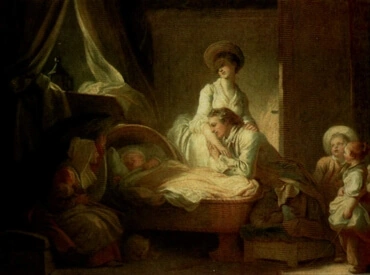In a general sense, being "born" in the Bible represents one spiritual state producing another, usually some form of love or affection producing or "giving birth" to truth or to desires for good. This is not hard to see: If you love someone, that love naturally gives birth to ideas on how to be good to that person and make him or her happy. This is why sons and daughters in the Bible represent true ideas and desires for good. On a higher level, though, being born represents what the Writings call "regeneration," or the life-long process of putting off our natural thoughts and desires and embracing spiritual life from the Lord. This is what the Bible means when it talks about being "born again" – if we live our lives from the Lord, He will eventually take away our evil desires so that we can be "born" as angels in heaven, free of evil desires and dark thoughts. Of course, these two levels of meaning are really one: The Lord is love itself, and if we align with Him we become forms of love and truth ourselves, expressions of His love just as the desire to do something good might be the expression of your love for a friend.
Arcana Coelestia #5349
5349. 'before the year of the famine came' means which were born through the natural. This is clear from the meaning of 'before the year of the famine came' as while the state lasted when truth derived from good was multiplied. This state is meant by 'the years of abundance of corn', and so that which came before the state of desolation meant by 'the years of famine'. Because in the state that came first truth derived from good was multiplied in the natural, so that good and truth were born to the celestial of the spiritual through the natural, that which followed as a consequence is therefore meant by the words used here.
Genesis 25
1
Abraham took another wife, and her name was Keturah.
2
She bore him Zimran, Jokshan, Medan, Midian, Ishbak, and Shuah.
3
Jokshan became the father of Sheba, and Dedan. The sons of Dedan were Asshurim, Letushim, and Leummim.
4
The sons of Midian: Ephah, Epher, Hanoch, Abida, and Eldaah. All these were the children of Keturah.
5
Abraham gave all that he had to Isaac,
6
but to the sons of Abraham's concubines, Abraham gave gifts. He sent them away from Isaac his son, while he yet lived, eastward, to the east country.
7
These are the days of the years of Abraham's life which he lived: one hundred seventy-five years.
8
Abraham gave up the spirit, and died in a good old age, an old man, and full of years, and was gathered to his people.
9
Isaac and Ishmael, his sons, buried him in the cave of Machpelah, in the field of Ephron, the son of Zohar the Hittite, which is before Mamre,
10
the field which Abraham purchased of the children of Heth. Abraham was buried there with Sarah, his wife.
11
It happened after the death of Abraham that God blessed Isaac, his son. Isaac lived by Beer Lahai Roi.
12
Now this is the history of the generations of Ishmael, Abraham's son, whom Hagar the Egyptian, Sarah's handmaid, bore to Abraham.
13
These are the names of the sons of Ishmael, by their names, according to the order of their birth: the firstborn of Ishmael, Nebaioth, then Kedar, Adbeel, Mibsam,
15
Hadad, Tema, Jetur, Naphish, and Kedemah.
16
These are the sons of Ishmael, and these are their names, by their villages, and by their encampments: twelve princes, according to their nations.
17
These are the years of the life of Ishmael: one hundred thirty-seven years. He gave up the spirit and died, and was gathered to his people.
18
They lived from Havilah to Shur that is before Egypt, as you go toward Assyria. He lived opposite all his relatives.
19
This is the history of the generations of Isaac, Abraham's son. Abraham became the father of Isaac.
20
Isaac was forty years old when he took Rebekah, the daughter of Bethuel the Syrian of Paddan Aram, the sister of Laban the Syrian, to be his wife.
21
Isaac entreated Yahweh for his wife, because she was barren. Yahweh was entreated by him, and Rebekah his wife conceived.
22
The children struggled together within her. She said, "If it be so, why do I live?" She went to inquire of Yahweh.
23
Yahweh said to her, "Two nations are in your womb. Two peoples will be separated from your body. The one people will be stronger than the other people. The elder will serve the younger."
24
When her days to be delivered were fulfilled, behold, there were twins in her womb.
25
The first came out red all over, like a hairy garment. They named him Esau.
26
After that, his brother came out, and his hand had hold on Esau's heel. He was named Jacob. Isaac was sixty years old when she bore them.
27
The boys grew. Esau was a skillful hunter, a man of the field. Jacob was a quiet man, living in tents.
28
Now Isaac loved Esau, because he ate his venison. Rebekah loved Jacob.
29
Jacob boiled stew. Esau came in from the field, and he was famished.
30
Esau said to Jacob, "Please feed me with that same red stew, for I am famished." Therefore his name was called Edom.
31
Jacob said, "First, sell me your birthright."
32
Esau said, "Behold, I am about to die. What good is the birthright to me?"
33
Jacob said, "Swear to me first." He swore to him. He sold his birthright to Jacob.
34
Jacob gave Esau bread and stew of lentils. He ate and drank, rose up, and went his way. So Esau despised his birthright.







